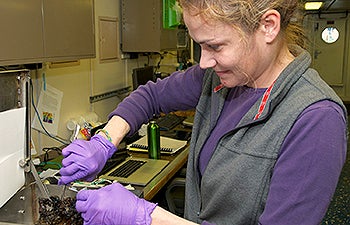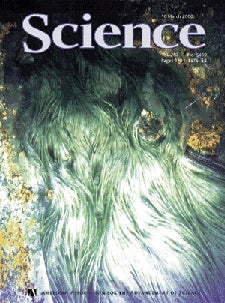In Memoriam: Katrina J. Edwards, 46
Katrina J. Edwards, professor of biological sciences and earth sciences at USC Dornsife, a leader in the field of geomicrobiology, has died. She was 46.
Edwards of South Pasadena, California, died peacefully on Oct. 26 after a long illness.
“A gifted scientist, Katrina was bright, vibrant and at the helm of her chosen field,” said her brother Ben Edwards and sisters Nina and Melanie Edwards in a statement on behalf of the family. “We, along with many friends and colleagues, loved her spontaneity and sense of humor and respected her undeniable genius. Her strength and spirit live on especially in her children as well as all who came to know her during her 46 years.”
Edwards made pioneering advances in understanding “intraterrestrials” or microbes living miles below the ocean’s crust and sediment. About one-third of the world’s biomass is thought to exist beneath the ocean floor, but prior to her explorations this rich biological world had seen little scientific study. Edwards’ research illuminated the reciprocal interactions between microbes, rocks and minerals in the ocean’s crust and how these interactions influence global biogeochemical processes.
“If you think about the bottom of the ocean, and that is a big if, you probably think of one of two settings: abyssal, wafting plains of sediments or smoking hot hydrothermal vents,” Edwards said in a 2010 interview for USC Dornsife Magazine. “What lies in-between — hundreds of square kilometers in aerial extent, down kilometers below the ocean bottom, lies an active, living intraterrestrial ecosystem — this is what I think about almost all of the time.”
David Hutchins, professor of biological sciences and head of the department’s marine and environmental biology section, called Edwards one of “our brightest rising stars.”
“Katrina played a catalytic role in developing the mysterious and fascinating deep biosphere of the ocean as a maturing marine science discipline, a contribution that was recognized by her international scientific peers,” he said.
Taking a leadership role in organizing the deep biosphere research community, Edwards served on numerous integrated ocean drilling program steering committees as well as headed the National Science Foundation (NSF)-supported Fe-Oxidizing Microbial Observatory Project on Loihi Seamount.
In 2009, with the support of a $29 million grant from the NSF, Edwards and her USC team partnered with several major research universities and national laboratories to establish the Center for Dark Energy Biosphere Investigations (C-DEBI), the second NSF Science and Technology Center headquartered at USC. While principal investigator and founding director of C-DEBI, Edwards led expeditions in the North Atlantic Ocean to collect data and learn more about the role that tiny subseafloor microbes play in shaping the oceans and crust of the Earth.

Katrina Edwards investigated microbes, rocks and minerals in the ocean’s crust and how their interactions influence global biogeochemical processes. Here she samples microbes from rocks collected from the ocean floor and brought back to USC after one of her research expeditions. Photo by Brian Glazer.
John Heidelberg, associate professor of biological sciences, said it was Edwards’ incredible scientific vision that crystallized the work of C-DEBI and that motivated him to join the team.
“Few could have inspired so many members of the scientific community — both those already studying the deep biosphere and those that work in other more disparate fields — to begin to tackling the difficult questions concerning life in this ecosystem,” Heidelberg said. “Through Katrina I was exposed to the scientific delights of working on difficult questions in a very difficult location on Earth. She will be enormously missed.”
A dedicated teacher and mentor, Edwards guided the work of dozens of undergraduates, graduate students and postdoctoral researchers.
Douglas Capone, William and Julie Wrigley Chair in Environmental Studies and professor and chair of biological sciences, who taught with Edwards, recalled the energy and enthusiasm she brought to the classroom.
“Katrina was an engaging lecturer who truly drew students into her passion,” he said. “I will always remember the sparkle in her eyes when she was connecting on her topic.”
As a former postdoctoral researcher mentored by Edwards, Jason Sylvan reflected upon her ceaseless encouragement and tireless promotion of him and his work.
“I always felt that she had my back,” said Sylvan, who is now assistant professor (research) of biological sciences at USC Dornsife. “This allowed me to open up and take calculated risks, which I think is an important part of maturing as a scientist. The words ‘that can’t be done’ were anathema to her, and in my time with her I repeatedly watched her make things happen that were beyond my imagination.
“Katrina trained a large group of students and postdocs who are already leading the next generation of deep biosphere research,” Sylvan added. “Her legacy will be felt for many years to come.”
Edwards was born in Columbus, Ohio, and was the third of five children raised by her parents Sandra and Timothy Edwards. She spent several years assisting her father and siblings in general airport operations at the Delaware Municipal Airport, eventually becoming chief flight instructor.
She then attended The Ohio State University receiving a bachelor’s degree with honors in geology in 1994. She went on to earn her master’s in geology with an emphasis on isotope geochemistry at the University of Wisconsin, Madison in 1996 and then her Ph.D. in geomicrobiology from the same institution in 1999.

In March 2000, Katrina Edwards had her first paper, “An Archaeal Iron-oxidizing Extreme Acidophile Important in Acid Mine Drainage,” featured as the cover story in the journal Science.
Having served on her examining and thesis committees at the University of Wisconsin, Kenneth Nealson, Wrigley Chair in Environmental Studies and professor of earth sciences and biological sciences at USC Dornsife, recalled later collaborating with Edwards on NSF grant review panels after she became an associate scientist in the Department of Marine Chemistry and Geochemistry at the Woods Hole Oceanographic Institution.
“She showed up with her baby in tow and contributed to the discussions in an excellent way — all members of the panel were in awe of her,” he said. “After Katrina moved to USC, she proved to be the superstar I had always anticipated. In the world of geobiology at USC, it is now hard to imagine anything occurring that was not started or improved upon by Katrina Edwards.”
Capone called Edwards’ recruitment to USC in 2006 as part of a cluster hire in the marine and environmental biology section “a transformative event.”
“Katrina went on to perform her own scientific transformations by networking the marine deep biosphere community first through an NSF Research Coordination Network and subsequently by winning the competition for an NSF Science and Technology Center with C-DEBI, which placed USC at the center of this nexus.”
Recognizing her indelible contributions, Edwards received the Royal Society of Canada’s 2012 A.G. Huntsman Award for Excellence in Marine Science, one of ocean sciences’ highest honors, for her innovative oceanographic research. She was the third woman to receive this distinction in its 32-year history.
In 2011, Edwards was elected a fellow of the American Association for the Advancement of Science and a fellow of the American Academy of Microbiology in 2010. Edwards was also a member of the American Geophysical Union, American Society for Microbiology, International Society for Microbial Ecology and Mineralogical Society of America.
Edwards authored approximately 100 published papers as well as edited and contributed to textbooks in the microbiology field. While leading the two-month research trip into the heart of the Mid-Atlantic Ocean, Edwards blogged about the team’s experiences so that the public could follow the expedition as it unfolded. That blog was published on Scientific American’s website.
She also served on the editorial boards of Environmental Microbiology, Geobiology Journal and Geomicrobiology Journal, and was associate editor of American Mineralogist.
Karla Heidelberg, associate professor (teaching) of biological sciences and director of the USC Environmental Studies Program, described Edwards as not only a true visionary in the field, but a role model for women in science as she juggled raising her daughters with advancing a groundbreaking research program.
“Katrina’s innate ability to build and lead strong teams, to nurture a community of young researchers and educators, and to secure the resources necessary to accomplish her important goals was part of her success,” Heidelberg said. “We will remember her tenacious passion for science, vision, enthusiasm and her humor.”
Edwards is survived by her children Ania, Katya and Nakita Webb; her parents Timothy and Sandra; her siblings Ben, Melanie and Nina; and many nieces and nephews. She was preceded in death by her sister Laura Edwards, who died in 2005.
A memorial website honoring Edwards’ legacy has been created by her family, friends, and USC, Woods Hole and C-DEBI colleagues.
In lieu of flowers, contributions may be made to Girlstart’s Katrina Edwards Memorial Fund, which will provide scholarships to high-need girls to attend a week of Girlstart Summer Camp and inspire them to pursue their passions in STEM-related fields.
Ben Edwards, Carl Marziali, Laura Paisley, Robert Perkins and Kimberly Ratcliff contributed to this obituary.